Related Research Articles
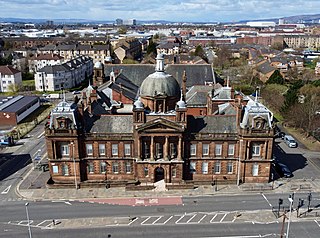
Govan is a district, parish, and former burgh now part of southwest Glasgow, Scotland. It is situated 2+1⁄2 miles west of Glasgow city centre, on the south bank of the River Clyde, opposite the mouth of the River Kelvin and the district of Partick. Historically it was part of the County of Lanark.
Red Clydeside was the era of political radicalism in Glasgow, Scotland, and areas around the city, on the banks of the River Clyde, such as Clydebank, Greenock, Dumbarton and Paisley, from the 1910s until the early 1930s. Red Clydeside is a significant part of the history of the labour movement in Britain as a whole, and Scotland in particular.
Kilbarchan is a village and civil parish in central Renfrewshire, in the west central Lowlands of Scotland. It is almost contiguous with Johnstone, about 5 miles or 8 km west of the centre of Paisley. The village's name means "cell (chapel) of St. Barchan". It is known for its former weaving industry.

A rent strike is a method of protest commonly employed against large landlords. In a rent strike, a group of tenants come together and agree to refuse to pay their rent en masse until a specific list of demands is met by the landlord. This can be a useful tactic of final resort for use against intransigent landlords, but carries the risk of eviction and lowered credit scores in some cases.

Mary Barbour was a Scottish political activist, local councillor, bailie and magistrate. Barbour was closely associated with the Red Clydeside movement in the early 20th century and especially for her role as the main organiser of the women of Govan who took part in the rent strikes of 1915.

Sir Patrick Joseph Dollan and his wife, Agnes, Lady Dollan were Glasgow activists in the Scottish Independent Labour Party. During the First World War they campaigned against the Munitions of War Act of 1915 which suspended trade unionists' rights for the duration of hostilities.
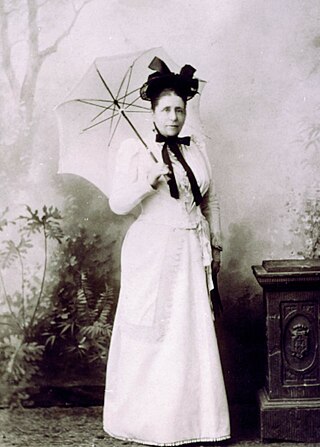
Isabella Ure Elder (15 March 1828 – 18 November 1905) was a Scottish philanthropist who took a particular interest in education, especially of women, and in the welfare of the people of Govan in Glasgow. In Govan alone, Elder was responsible for building Elder Park Library, a School for Domestic Economy, Cottage Hospital, the Cottage Nurses Training Home, and erecting a statue in honour of her husband John Elder. She also gave Elder Park to the people of Govan. Many of her philanthropic works are still open to the community today.
The politics of Glasgow, Scotland's largest city by population, are expressed in the deliberations and decisions of Glasgow City Council, in elections to the council, the Scottish Parliament and the UK Parliament.
Events from the year 1915 in Scotland.
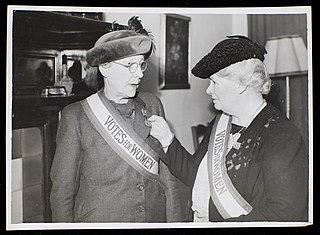
Helen Crawfurd was a Scottish suffragette, rent strike organiser, Communist activist and politician. Born in Glasgow, she was brought up there and in London.
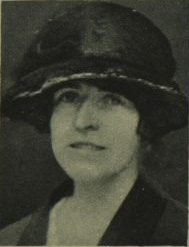
Agnes Johnston Dollan MBE, also known as Agnes, Lady Dollan, was a Scottish suffragette and political activist. She was a leading campaigner during the Glasgow Rent Strikes, and a founding organiser of the Women's Peace Crusade. In 1919, she was the first woman selected by the Labour party to stand for election to Glasgow Town Council, and later became Lady Provost of Glasgow.
Mary Laird was a founding member and first President of the Glasgow Women's Housing Association, a President of the Partick Branch of the Women's Labour League, associated with the Red Clydeside movement, and supported the Glasgow Rent Strikes of 1915 alongside Mary Barbour, Agnes Dollan, Mary Jeff and Helen Crawfurd. Laird went on to participate in wider social activism for women and children's rights.

The Increase of Rent and Mortgage Interest Act 1915 is an act of the Parliament of the United Kingdom which restricted increases in rent and the rate of mortgage interest during World War I. The act was in place on 25 November 1915 with its restrictions retrospectively in place from 4 August 1914.

The Women's Peace Crusade was a grassroots socialist movement that spread across Great Britain between 1916 and 1918. Its central aim was to spread a 'people's peace', which was defined as a negotiated end to the First World War without any annexations or indemnities. The movement was first established in Glasgow in July 1916, and officially launched on 10 June 1917. It later spread across Great Britain, with demonstrations taking place in Leeds, Bradford, Leicester, Birmingham and Lancashire. Although it gathered a substantial following, the Women's Peace Crusade faced opposition from both the government and police, with members being arrested and reportedly threatened.
Glasgow Women's Housing Association (GWHA) was established in Glasgow, Scotland, in mid-1914 by the Independent Labour Party Housing Committee launched by Andrew McBride in 1913 and the Women's Labour League in reaction to the increasing rent prices and overcrowding exacerbated by the advent of the First World War.
Red Skirts on Clydeside, produced in 1984, is the fifth documentary film made by the Sheffield Film Cooperative. It follows the process of rediscovering women's histories, focusing on the Glasgow Rent Strikes of 1915 and four of the women involved: Helen Crawfurd, Agnes Dollan, Mary Barbour, Jean Fergusson.

Mary Jeff (1873–1941) was a Scottish activist and politician who was involved in the Glasgow rent strike.

Jenny Kerr Hyslop born Janet Kerr Reid was a Scottish community leader, co-operative worker and disability activist.
Jessie Fergusson was a Scottish suffragette. She played an active role in the rent strike and was the secretary of the Glasgow branch of The Worker’s Suffrage Federation when it first was established.
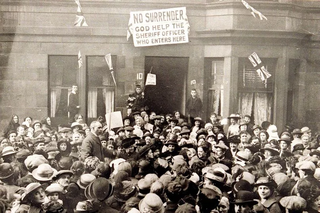
The 1915 Glasgow rent strikes were a series of tenant mobilizations by Glasgow, Scotland tenants opposing rent increases by landlords, who raised rents following a housing shortage.
References
- ↑ "International Women's Day celebrates the life of Mary Barbour". BBC News. Retrieved 2 July 2016.
- ↑ "Red Clydeside: Mary Barbour". sites.scran.ac.uk. Retrieved 2 July 2016.
- ↑ "Mary Barbour | Mapping Memorials to Women in Scotland". womenofscotland.org.uk. Retrieved 2 July 2016.
- ↑ "Class War on the Homes Front: The Glasgow Rent Strikes of 1915 | Leftcom". www.leftcom.org. Retrieved 2 July 2016.
- ↑ Melling, Joseph (1983). Rent Strikes: Peoples' Struggle for Housing in West Scotland 1890-1916. Polygon. p. 64. ISBN 0904919722.
- ↑ "Women on the Left: Mary Barbour |". 9 February 2015. Archived from the original on 9 February 2015. Retrieved 27 November 2020.
{{cite web}}: CS1 maint: bot: original URL status unknown (link) - ↑ "Council housing". www.parliament.uk. Retrieved 27 November 2020.